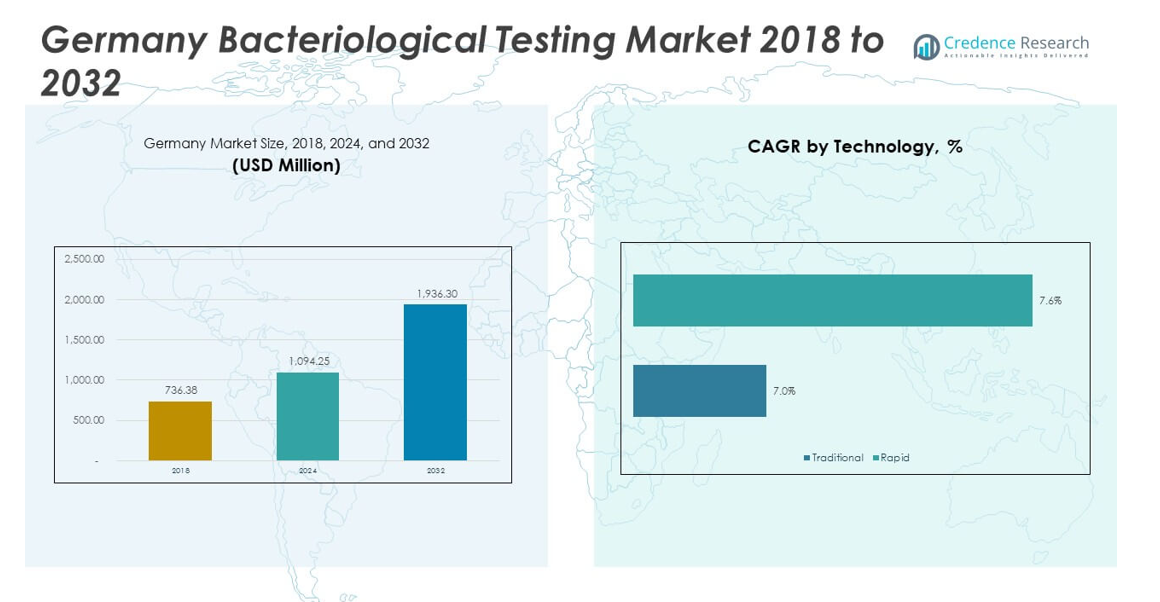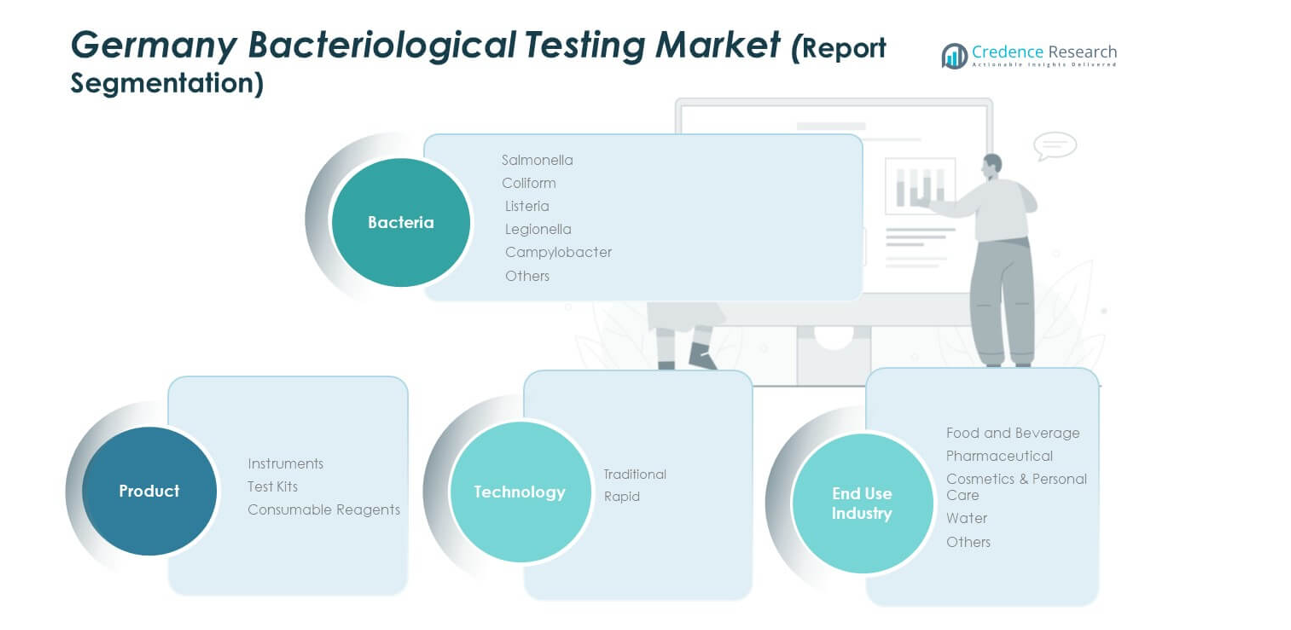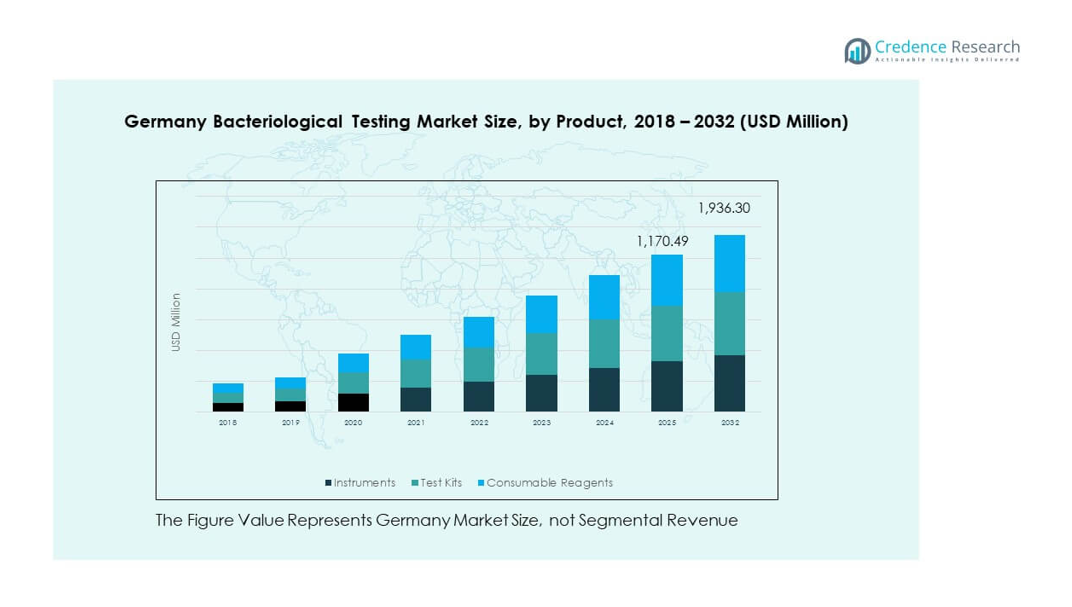Market Overview:
The Germany Bacteriological Testing Market size was valued at USD 736.38 million in 2018 to USD 1,094.25 million in 2024 and is anticipated to reach USD 1,936.30 million by 2032, at a CAGR of 7.29% during the forecast period.
| REPORT ATTRIBUTE |
DETAILS |
| Historical Period |
2020-2023 |
| Base Year |
2024 |
| Forecast Period |
2025-2032 |
| Germany Bacteriological Testing Market Size 2024 |
USD 1,094.25 million |
| Germany Bacteriological Testing Market, CAGR |
7.29% |
| Germany Bacteriological Testing Market Size 2032 |
USD 1,936.30 million |
The market is driven by increasing concerns about food safety, rising healthcare-associated infections, and stricter regulatory standards. Growing demand for processed and packaged foods has amplified the need for routine bacteriological testing across food and beverage facilities. Healthcare institutions are also strengthening their testing protocols to prevent contamination risks. Moreover, government initiatives focusing on public health surveillance and consumer protection continue to accelerate adoption of advanced bacteriological testing solutions across industries.
Regionally, Western Europe dominates the market due to strong food safety laws, advanced healthcare infrastructure, and high awareness among consumers. Germany stands as a key hub because of its robust industrial base and stringent regulatory frameworks. Emerging Eastern European countries are expected to witness faster adoption, driven by improving laboratory capabilities and harmonization of safety standards with the EU. This shift highlights the growing balance between established markets and developing regional players.

Market Insights:
- The Germany Bacteriological Testing Market was valued at USD 736.38 million in 2018, reached USD 1,094.25 million in 2024, and is projected to hit USD 1,936.30 million by 2032, growing at a CAGR of 7.29%.
- Western Germany held the largest share at 41% in 2024, supported by strong healthcare systems and advanced food processing industries. Southern Germany followed with 28% share due to robust manufacturing and exports, while Northern Germany accounted for 19% driven by port trade and seafood testing.
- Eastern Germany, with 12% share in 2024, is the fastest-growing region, supported by industrial investments, EU-backed programs, and expanding laboratory infrastructure.
- In 2024, test kits represented the largest share of product demand at around 40%, driven by high adoption in food and healthcare applications.
- Consumable reagents followed with approximately 35% share, reflecting recurring demand for routine bacteriological testing across industries.
Access crucial information at unmatched prices!
Request your sample report today & start making informed decisions powered by Credence Research Inc.!
Download Sample
Market Drivers:
Rising Demand for Food Safety Testing Across Processed and Packaged Food Sector
The Germany Bacteriological Testing Market benefits strongly from strict food safety standards that shape consumer trust and industry compliance. Packaged and processed food demand continues to expand with urban lifestyles and retail growth. Regulatory bodies enforce regular inspections to minimize contamination and safeguard public health. Companies focus on rigorous microbiological checks to meet certification and labelling requirements. Strong awareness among consumers about foodborne illnesses drives adoption of preventive testing methods. It supports the expansion of specialized laboratories across major cities. Growing retail penetration and exports further strengthen the role of bacteriological testing in the food chain.
- For instance, SGS Germany offers a range of rapid food microbiology testing services, including the detection of coliand Salmonella through PCR technology, helping food producers ensure quality and safety.
Healthcare Sector Expansion with Growing Need for Infection Control Testing
Germany’s advanced healthcare system increases reliance on bacteriological testing for infection management and patient safety. Hospitals adopt strict testing protocols to identify potential bacterial risks in wards and surgical environments. Public health authorities emphasize surveillance programs to reduce healthcare-associated infections. Rising cases of antibiotic resistance highlight the urgency for accurate detection methods. The Germany Bacteriological Testing Market supports hospitals with rapid testing kits and automated systems. Investments in clinical diagnostics enable better patient outcomes and reduced risks of contamination. Expanding medical facilities across urban and rural areas create consistent demand for laboratory solutions. Rising government focus on public health surveillance makes testing essential in long-term strategies.
- For instance, the Becton Dickinson (BD) Phoenix M50 system has shown high accuracy rates for automated bacterial identification and antimicrobial susceptibility testing, although the specific accuracy varies depending on the type of organism and the test performed. Some studies have reported overall agreement rates near or above 98% for certain organisms.
Government Regulations Driving Compliance and Strengthening Industry Standards
Government agencies in Germany enforce strict safety policies that mandate bacteriological testing across food, beverage, and healthcare industries. Businesses adopt advanced technologies to remain compliant with these frameworks. The regulatory push ensures routine monitoring of water quality and processed products. Strong policies promote investments in laboratory capacity and infrastructure. The Germany Bacteriological Testing Market adapts to frequent updates in national and EU-level safety norms. It encourages collaboration between regulators and industries to strengthen consumer safety. Compliance standards also open opportunities for certified labs to expand their services. Overall, strict policies make bacteriological testing an indispensable function in regulated industries.
Technological Advancements Enhancing Accuracy and Speed of Testing Processes
Emerging diagnostic technologies strengthen the efficiency of bacteriological testing across sectors. Automated instruments reduce human errors and enable high-throughput testing capabilities. Rapid test kits shorten turnaround time, ensuring timely decision-making for industries and hospitals. The Germany Bacteriological Testing Market integrates AI-powered systems that provide predictive analysis and data-driven insights. It helps companies address risks before they escalate into safety crises. Advances in portable devices also make on-site testing possible in food and healthcare settings. The innovation ecosystem in Germany supports start-ups and research institutes working on improved microbiological solutions. Overall, continuous technological progress drives both adoption and trust in bacteriological testing.

Market Trends:
Integration of Automation and Artificial Intelligence into Diagnostic Testing Systems
Automation transforms bacteriological testing by reducing manual intervention and improving reliability. Laboratories adopt AI algorithms to analyze large datasets faster and with greater precision. Robotic sample handling enhances speed while lowering costs for routine processes. The Germany Bacteriological Testing Market experiences a shift toward predictive diagnostics powered by machine learning. It enables industries to identify contamination risks early in the production chain. Cloud integration supports real-time monitoring and centralized reporting across multiple facilities. Growing use of automation reshapes workflows in food testing and hospital laboratories. This trend sets the foundation for a data-driven testing ecosystem in Germany.
- For instance, in July 2025, Eurofins Discovery presented its top innovator awards, which included recognition for an AI-integrated assay for predictive toxicology that demonstrated enhanced speed and consistency.
Increasing Role of Contract Testing Laboratories in Market Expansion
Businesses outsource bacteriological testing to certified contract laboratories due to cost efficiency and expertise. Contract labs offer advanced infrastructure without requiring heavy capital investments from companies. The Germany Bacteriological Testing Market witnesses rising collaboration between food processors, healthcare providers, and independent labs. It ensures timely compliance with regulatory standards while reducing operational burdens. Contract testing provides flexibility for small and medium enterprises lacking in-house facilities. Expansion of global laboratory chains in Germany strengthens the market’s reach and capabilities. Strong reputation for accuracy builds trust among manufacturers and consumers. Outsourcing thus emerges as a key trend shaping the competitive landscape.
- For instance, in fiscal year 2024, the parent company ALS Global reported 12.4% revenue growth in its Life Sciences division, which includes food and pharmaceutical testing. This growth was partially driven by a volume and price recovery in the food business in the strong European markets, which includes Germany.
Growing Focus on Sustainable and Eco-Friendly Testing Solutions Across Industries
Sustainability shapes technological innovation in bacteriological testing, driven by global climate policies. Laboratories adopt resource-efficient methods that reduce water and energy use during testing. Eco-friendly reagents gain traction as companies align with green practices. The Germany Bacteriological Testing Market adapts by promoting recyclable materials in test kits. It encourages manufacturers to reduce plastic waste from disposable lab supplies. Rising pressure from consumers and regulators promotes adoption of sustainable testing frameworks. Businesses emphasize environmental responsibility as part of brand reputation. This trend links food safety and public health with broader sustainability goals.
Expansion of Digital Platforms for Remote Monitoring and Data Management
Digital platforms support remote access to testing results, enabling faster decision-making. Cloud-based solutions allow industries to track compliance across multiple production sites. The Germany Bacteriological Testing Market leverages advanced software for real-time reporting. It helps government agencies monitor food and water quality across regions. Digital integration also facilitates predictive analytics for contamination risk. Secure platforms ensure confidentiality while allowing easy sharing with stakeholders. Increasing adoption of digital solutions modernizes the market’s infrastructure. This trend creates an interconnected ecosystem that strengthens reliability and efficiency in bacteriological testing.
Market Challenges Analysis:
High Cost of Advanced Testing Technologies and Limited Accessibility for Smaller Enterprises
Advanced bacteriological testing solutions demand significant investments in infrastructure and skilled staff. Small and medium enterprises face barriers in adopting these high-cost technologies. Contract labs provide relief but add recurring expenses that limit profit margins. The Germany Bacteriological Testing Market faces unequal access between large corporations and smaller players. It creates a divide in compliance capabilities and quality assurance levels. Rising costs of reagents and maintenance also affect laboratory efficiency. It places pressure on food producers and healthcare institutions with tight budgets. This cost factor continues to challenge widespread adoption of modern solutions.
Complex Regulatory Frameworks and Skilled Workforce Shortages in Specialized Testing Areas
Regulatory compliance requires continuous updates to testing protocols, adding administrative complexity. Small firms often struggle to align with both national and EU standards. The Germany Bacteriological Testing Market depends heavily on qualified microbiologists and lab technicians. It faces shortages of skilled professionals trained in modern diagnostic systems. Recruitment challenges slow the adoption of advanced automated platforms. Complexity in certification processes further delays compliance timelines. Businesses must invest in training programs to bridge knowledge gaps. These workforce and compliance challenges hinder growth momentum across industries relying on bacteriological testing.
Market Opportunities:
Expanding Demand for Advanced Rapid Testing Kits Across Food and Healthcare Industries
Rapid testing kits create strong growth potential for ensuring timely results in food and hospital settings. The Germany Bacteriological Testing Market gains opportunities from manufacturers introducing user-friendly and portable solutions. It helps industries meet compliance faster while reducing downtime in operations. Adoption increases among mid-sized food processors and diagnostic centers seeking efficiency. Rising government support for innovation further strengthens commercial opportunities. Global players expand product portfolios to capture Germany’s growing market base. Overall, advanced rapid kits open new opportunities across critical sectors.
Rising Adoption of Digital Platforms for Data Management and Predictive Testing Applications
Digital transformation creates strong potential for enhancing efficiency and transparency across industries. The Germany Bacteriological Testing Market embraces cloud platforms and AI-based analytics to improve outcomes. It helps companies predict contamination risks early and optimize safety standards. Remote monitoring supports better collaboration between industries and regulatory bodies. Strong cybersecurity integration builds trust in digital adoption. Global software providers focus on localized solutions for German industries. This creates long-term opportunities for both domestic and international players.
Market Segmentation Analysis:
By Product
Instruments account for a significant share due to widespread adoption in laboratories for accurate detection. Test kits demonstrate rapid growth supported by increasing demand for quick and user-friendly solutions in both food and healthcare applications. Consumable reagents remain essential for recurring testing needs, ensuring continuous revenue streams and supporting long-term industry growth. The Germany Bacteriological Testing Market strengthens its product diversity to cater to both large laboratories and smaller diagnostic centers.
- For instance, Thermo Fisher Scientific provides SureTect PCR Assay kits for food pathogen testing, with a workflow time of less than 24 hours per sample, primarily used by food safety testing laboratories. The complete process includes an enrichment step lasting between 8 and 24 hours and an ~80 minute PCR analysis, though some labs use automation to increase efficiency.
By Bacteria
Salmonella dominates testing demand, driven by its prevalence in foodborne outbreaks and regulatory monitoring. Coliform testing expands strongly due to its role as an indicator organism in water and food safety. Listeria and Legionella represent critical segments for healthcare and water treatment facilities. Campylobacter and other bacteria categories add to the broader scope of safety and diagnostic testing. It ensures comprehensive bacterial detection aligned with national health standards.
By Technology
Traditional methods maintain use in routine microbiological practices, especially across small labs with cost-sensitive budgets. Rapid testing technology advances quickly, fueled by automation and digital platforms that provide faster results. It delivers efficiency and supports real-time decision-making across industries. Rapid methods increasingly replace conventional approaches where speed and accuracy are critical.
By End User
Food and beverage applications lead demand due to strict safety regulations and continuous monitoring needs. Pharmaceuticals represent another strong end user, focusing on sterile production and patient safety. Cosmetics and personal care industries adopt testing to ensure product quality and compliance. Water utilities rely heavily on bacteriological testing for public health protection. Other industries contribute steadily, creating a balanced demand base across end-user segments.

Segmentation:
- By Product
- Instruments
- Test Kits
- Consumable Reagents
- By Bacteria
- Salmonella
- Coliform
- Listeria
- Legionella
- Campylobacter
- Others
- By Technology
- By End User
- Food and Beverage
- Pharmaceutical
- Cosmetics & Personal Care
- Water
- Others
Regional Analysis:
Western Germany – Leading Regional Hub
Western Germany accounts for the largest share of the Germany Bacteriological Testing Market with 41% in 2024. Strong industrialization, dense population centers, and advanced healthcare infrastructure drive consistent demand. The region hosts major food processing companies and pharmaceutical hubs, which require frequent compliance testing. Laboratories in cities such as Cologne, Düsseldorf, and Frankfurt lead in adopting rapid technologies. Government programs supporting food safety and public health enhance regional adoption. It remains the epicenter for innovation and investment in bacteriological testing solutions.
Southern Germany – Expanding Demand Base
Southern Germany holds 28% share, supported by a robust manufacturing sector and high food exports. Bavaria and Baden-Württemberg house leading research institutes and biotechnology companies that invest in bacteriological testing technologies. Strong presence of water utilities and chemical industries further contributes to testing adoption. The Germany Bacteriological Testing Market benefits from regional emphasis on sustainable production and rigorous quality control. Growing consumer demand for premium and safe food products increases reliance on advanced testing kits. It reflects a balanced mix of traditional and rapid testing applications.
Northern and Eastern Germany – Emerging Growth Regions
Northern Germany captures 19% share, led by Hamburg and Bremen with strong food trade and port activities. Water safety and seafood testing drive the segment’s importance in the region. Eastern Germany represents 12% share, but it shows strong growth potential due to increasing industrial investments and modern laboratory infrastructure. The Germany Bacteriological Testing Market finds opportunities in these regions as EU-funded projects enhance public health programs. Expanding healthcare access and rising consumer awareness stimulate demand. It positions northern and eastern states as future contributors to national market expansion.
Shape Your Report to Specific Countries or Regions & Enjoy 30% Off!
Key Player Analysis:
Competitive Analysis:
The Germany Bacteriological Testing Market features intense competition among global leaders and regional specialists. Multinational firms such as Thermo Fisher Scientific, Eurofins, Merck KGaA, and Bio-Rad Laboratories strengthen their positions through broad portfolios and strong research pipelines. Local players including Analytik Jena GmbH and Molzym GmbH emphasize niche innovations and tailored solutions for healthcare and industrial applications. It is shaped by consistent investments in automation, rapid testing technologies, and partnerships with government agencies to meet evolving regulatory standards. Competitive intensity is marked by mergers, acquisitions, and expansion of contract testing laboratories, which allow players to enhance geographic presence and serve diverse industries effectively.
Recent Developments:
- In August 2025, Eppendorf SE introduced the Research 3 neo pipette, a next-generation mechanical pipette that delivers enhanced adaptability, precision, and comfort for laboratory workflows. The product features customizable ergonomics and rapid volume selection, expanding its usability across different testing protocols within the German bacteriological testing sector.
- On June 30, 2025, Merck KGaA finalized the acquisition of SpringWorks Therapeutics, marking one of the largest deals for Merck’s Healthcare segment in recent years. This move is set to bolster Merck’s innovation portfolio and growth in bacteriological and life science markets in Germany.
Report Coverage:
The research report offers an in-depth analysis based on product, bacteria, technology, and end-user segments. It details leading market players, providing an overview of their business, product offerings, investments, revenue streams, and key applications. Additionally, the report includes insights into the competitive environment, SWOT analysis, current market trends, as well as the primary drivers and constraints. Furthermore, it discusses various factors that have driven market expansion in recent years. The report also explores market dynamics, regulatory scenarios, and technological advancements that are shaping the industry. It assesses the impact of external factors and global economic changes on market growth. Lastly, it provides strategic recommendations for new entrants and established companies to navigate the complexities of the market.
Future Outlook:
- Strong regulatory oversight will continue driving demand across food, healthcare, and water industries.
- Rapid testing kits will gain prominence due to efficiency and rising need for quick results.
- Automation and AI-driven platforms will reshape laboratory workflows and enhance precision.
- Regional expansion of contract labs will strengthen accessibility for SMEs and local industries.
- Healthcare institutions will adopt advanced testing to counter antibiotic resistance threats.
- Sustainable testing practices will grow in importance, aligned with environmental regulations.
- Digital platforms for remote monitoring and predictive analytics will expand adoption.
- Investment in R&D will remain central for both global players and domestic innovators.
- Growing food exports will elevate testing demand across southern and western regions.
- Industry partnerships will expand knowledge sharing and accelerate technology adoption.






